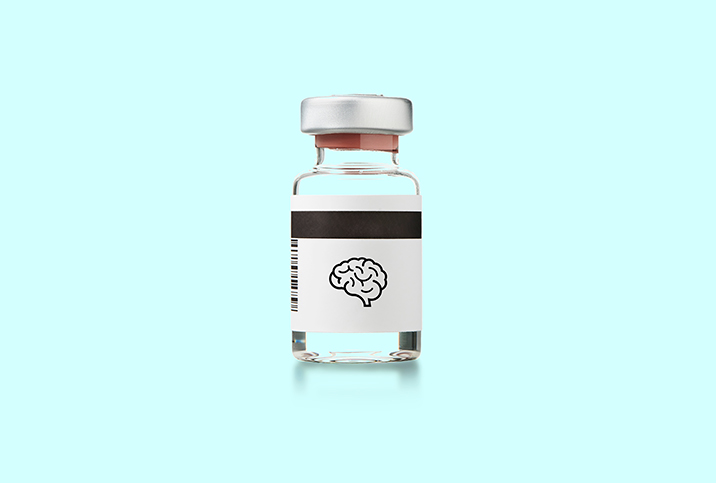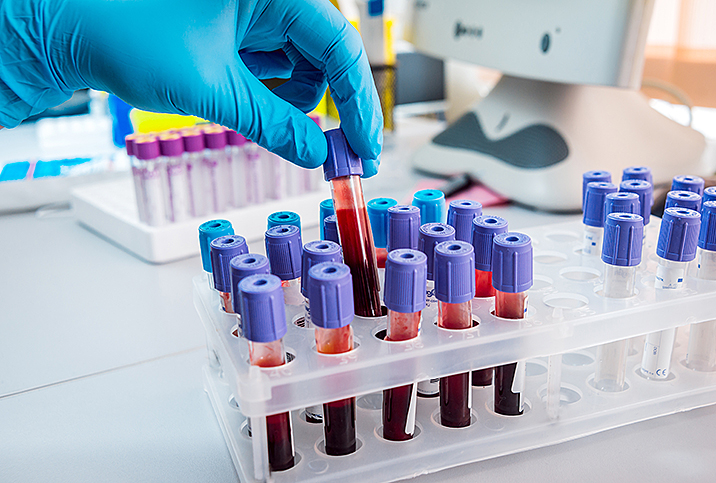6 Months Later, What We Know About the FDA-Approved Alzheimer's Drug

Alzheimer's affects about 5.8 million Americans, according to the Centers for Disease Control and Prevention (CDC), a figure projected to double by 2050.
In June 2021, the U.S. Food and Drug Administration (FDA) granted conditional approval to a new drug to treat the condition, Aduhelm, despite 10 of the Advisory Committee's 11 members agreeing that there was no evidence that the drug would help patients. The 11th member was uncertain on this point, but no member thought it would help. The first Alzheimer's drug to receive FDA approval since 2003, its release has, so far, received a decidedly mixed reception from the scientific community and public.
"I'm incredibly scared," said Ellie Busby, M.Sc., mBANT, and founder of the website Vojo in the U.K. Busby's father died of Alzheimer's two years ago after a turbulent and devastating decline. He carried the APOE4 gene, similar to Busby and her mother. The gene is thought to increase the risk of Alzheimer's disease significantly.
Although the drug's approval is ensnared in controversy, for Busby and others affected by Alzheimer's and a potential future diagnosis, the FDA's decision appears to be a beacon of hope in an otherwise bleak landscape. But is it just a mirage?
What is Alzheimer's?
Alzheimer's, the most common cause of dementia, is a progressive neurological disorder that causes the brain to atrophy and its cells to die. It affects memory, thinking and behavior, and is ultimately fatal.
Per the Mayo Clinic, Alzheimer's early stages may cause a patient to experience short-term memory loss. As the disease progresses, memory impairment becomes more severe, interfering with a person's ability to function independently.
According to the Alzheimer's Association, the disease's specific cause is unknown, although researchers believe it develops from multiple factors, including genetics, lifestyle and environment. While some indicators, including heredity and age, cannot be changed, scientists think certain behaviors—like maintaining an active lifestyle, eating a healthful diet and getting adequate sleep—can decrease the risk.
Dan Hurley of The Independent Pharmacy said despite the fact that it's been more than 100 years since the disease's discovery by German psychiatrist Alois Alzheimer, relatively little is known about the condition.
"The lack of certitude we have about Alzheimer's means we cannot predict with any certainty who will get this disease," he said. "Indeed, we have no real screening tests to identify the disease. All we're able to do at this stage is to determine that someone had Alzheimer's (and not some other form of dementia) after they have died by dissecting their brain. This has made developing a drug to tackle Alzheimer's an incredibly difficult task for researchers, as they're denied the full range of data they need to work on advancing treatments and cures for the syndrome."
Despite the lack of definitive tests, doctors use a range of assessments to make an Alzheimer's diagnosis, including neurological exams and genetic evaluations.
Despite the fact that it's been more than 100 years since the disease's discovery by German psychiatrist Alois Alzheimer, relatively little is known about the condition.
For individuals and families living with Alzheimer's, the uncertainty surrounding Alzheimer's can have explicit and substantial consequences. Busby's father initially exhibited symptoms in his early 60s, younger than the average onset age of 65-plus, and was initially incorrectly diagnosed with pseudo-dementia, which is a potential secondary symptom of depression.
"We had to fight to get the right diagnosis in the first couple of years," Busby said. "Because he was wrongly diagnosed, he lost his job and we had minimal support. It was a dark time, especially not knowing what was actually going on."
Busby's father was given antidepressants for the first two years and, after receiving an Alzheimer's diagnosis, received various other medicines, including anti-anxiety and antipsychotics.
"It took a long time to get his medication right," Busby said. "The side effects ranged from aggression to being completely out of it. My mum and I cared for him as much as we could at home, and we hardly got any support.
"I couldn't believe how little support there is for caring for a family member with dementia, especially if they get it younger than normal," she added. "He got increasingly aggressive and difficult to handle, and was finally sectioned. He was on the section ward for six months, which was a traumatic place in itself, then transferred to a care home where he died a few weeks later from COVID-19."
What is Aduhelm and how does it work?
Aduhelm (generic name aducanumab) is designed for individuals in the early stages of Alzheimer's, or about a quarter of Americans currently living with the disease. Although it may slow the disease's progression, it is not a cure.
This first line of therapy eliminates amyloid plaques, thought to be either an underlying cause of Alzheimer's or a result of the disease. According to the Alzheimer's Association, amyloid is a toxic protein believed to destroy nerve cells (neurons) in the brain, leading to cognitive decline. However, some experts hypothesize amyloids may accumulate because of Alzheimer's, not the other way around.
Per the BrightFocus Foundation, in a healthy brain, amyloid proteins are broken down and removed. In those with Alzheimer's, they appear to accumulate into hard, insoluble clumps between neurons.
According to the Alzheimer's Association, the new drug Aduhelm is a monoclonal antibody (MAB) that stimulates the immune system to target and break apart the plaques so the body can discard them.
"It works like the antibodies our immune system makes to target bacteria and viruses," Hurley said. "Though, in the case of Aduhelm, this is designed to target aggregated forms of amyloid. In theory, the potential benefits are that if the amyloid is toxic to neurons in the brain, this will reduce the damage to neurons. The resulting benefit is that this will limit the damage Alzheimer's causes to the brain."
The patients involved in Aduhelm's clinical trials experienced mild forms of the disease or pre-Alzheimer's impairment. The FDA's label states the drug should only be prescribed to people with conditions similar to trial participants—that is, patients in the early stages of Alzheimer's whose brains contain high levels of amyloid.
According to the Alzheimer's Association, the most common side effects of Aduhelm are "amyloid-related imaging abnormalities (ARIA), headaches and falls." ARIA, which usually consists of temporary swelling, does not typically cause any symptoms, although headaches, dizziness, nausea, confusion and vision changes can occur.
Amyloid-related imaging abnormalities can be serious but resolve independently, per the Alzheimer's Association. Allergic reactions are possible, as is hemorrhaging. Patients who take the drug must have regular magnetic resonance imaging (MRI) scans to monitor for potential side effects.
Aduhelm is administered monthly via intravenous infusion. At an estimated $56,000 annually per patient, the steep price point presents another caveat, though many individuals and organizations are pressing the drug's manufacturer to reduce the cost to consumers.
Why the FDA advisory committee voted against approval
Most FDA Advisory Committee members voted against approving Aduhelm because the trials did not demonstrate its efficacy. The FDA's eventual decision to go against the Committee's recommendation was viewed as highly unusual.
"The committee used what's called 'post-hoc analysis' to make the drug pass," Hurley explained. "Post-hoc analysis is the practice of using statistical analyses and assessing data upon the conclusion of a study. This typically happens after the trials fail to meet their target of an improvement in Alzheimer's symptoms or disease progression. Furthermore, the effect of the drug is very minimal. Consequently, a mini-mental state exam (MMSE) was used to determine if the medication works. An MMSE is a 30-point questionnaire used to measure cognitive impairment. The MMSE showed an improvement after a year of less than [a score of] one—the minimal clinically significant benefit is normally at least three."
Hurley explained that while Aduhelm can clear amyloids, it isn't clear if doing so is beneficial, and added that by the time amyloid plaques have formed, it may be too late for patients.
"Aduhelm was tested in two Phase III trials, where both showed poor efficacy results," said Erika Gray, PharmD, chief medical officer and co-founder of Toolbox Genomics. "One study (EMERGE) met the primary endpoints—that's a good thing—for the trial, whereas the other study (ENGAGE) did not. Normally, the FDA requires two positive Phase III trial results in approval of a drug. The advisory committee that met in November 2020 did not believe it was reasonable to consider clinical benefit from only one trial as the primary evidence.
"A reduction in amyloid-beta plaque can be used as a surrogate endpoint to predict a positive clinical benefit, but is not itself a measure of clinical benefit," she added. "This means that it is still unclear if patients will see a tangible—visible or measurable—clinical benefit from the Aduhelm. When surrogate endpoints are used for accelerated approval, additional post-approval studies are required to collect data to verify the predicted clinical benefit termed 'confirmatory trials.' If these confirmatory trials do not verify the drug's anticipated clinical effect, then the FDA could remove the drug from the market."
What other treatments are available?
So far, Aduhelm is the only FDA-approved treatment that could slow disease progression. However, there are subsequent treatments available to assuage Alzheimer's symptoms. These include cholinesterase inhibitors, glutamate regulators, a combination of cholinesterase inhibitor and glutamate regulator, and an orexin receptor antagonist. The latter is used to treat behavioral and psychological symptoms, while the others address cognitive effects.
According to Hurley, until the disease is better understood, the likelihood of a surefire solution is slim at best.
"Most Alzheimer's drugs fail at every early stage of testing, as they fail to show efficacy," he explained. "Indeed, Alzheimer's trials have had a 99 percent failure rate."
Gray noted many scientists believe the high degree of clinical trial failures is due to the inclusion of patients in the late stages of the disease, for whom brain damage was irreversible. To combat this, the inclusion of patients in the early phases of the disease is crucial.
Until the disease is better understood, the likelihood of a surefire solution is slim at best.
"These patients will hopefully be able to determine if the clinical symptoms of Alzheimer's can be delayed or prevented," she said. "Overall, Alzheimer's is a complicated disease that the scientific community is continuously learning more about, and so hopefully, with the approval of Aduhelm, additional clinical trials will spell positive results for those seeking treatment for Alzheimer's."
As of May 2021, Gray said, there are 126 agents in 152 clinical trials with 28 treatments in Phase III trials. Most of these agents target the underlying biology of Alzheimer's, aiming to slow disease progression.
According to the Alzheimer's Association, the FDA also granted Breakthrough Therapy designation to two other treatments, Lecanemab and Donanemab, this past June. In a Phase II clinical trial of people with early Alzheimer's, Donanemab cleared beta-amyloid plaques and slowed the decline of memory, cognition and daily function. Another drug of the same type, Gantenerumab, is also in advanced clinical trials.
For many people living with Alzheimer's, and their loved ones, the potential benefits of such drugs outweigh the risks and hurdles.
"There are always side effects and things to be wary of with any drug," Busby said. "But dementia and Alzheimer's are such awful diseases, I would be willing to take any risks which may come with the drug if it improves dementia outcomes. Having lived with it, I'd personally try anything."




















